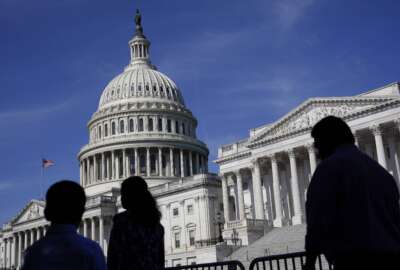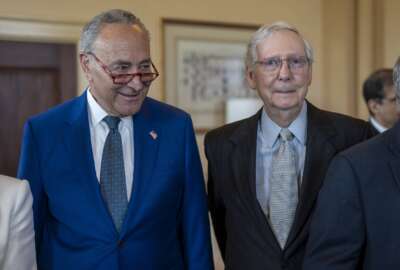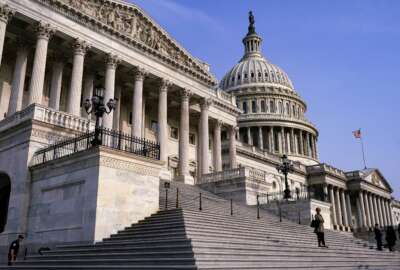Hubbard Radio Washington DC, LLC. All rights reserved. This website is not intended for users located within the European Economic Area.
Contractors are also combing through the House and Senate defense authorization bills
The defense authorization bills, while contentious, would do a lot for contractors; from inflation relief to easing greenhouse gas emissions reporting.
The defense authorization bills, while contentious, would do a lot for contractors; from inflation relief to easing greenhouse gas emissions reporting. For a summary, Federal Drive Host Tom Temin spoke with Haynes Boone procurement attorney Dan Ramish.
Interview Transcript:
Tom Temin The defense authorization bills, while contentious, would do a lot for contractors from inflation relief to easing greenhouse gas emissions reporting. We get a summary from Haynes Boone procurement attorney Dan Ramish. And I guess, Dan, we should begin by noting, even though the House and the Senate have each passed their NDAAs, there are social issues. The abortion travel question, which is keeping them pretty far apart. But you found some things from both sides of interest to federal contractors. Let’s start with inflation relief here.
Dan Ramish Yeah. Tom So inflation relief, of course, with the levels of inflation over the past few years being unprecedented, have been a real cause for concern for contractors. And there were a number of memos issued by the Defense Pricing and Contracting Office last year which led up to section 822 of last year’s NDAA, which provided new authority for DoD to provide relief on fixed price contracts for effects solely due to inflation. If the costs exceeded the price on a contract because of inflation and this relief was available to contractors and subcontractors. And there was a great deal of interest in this provision when it passed. The catch, of course, was that it relied on appropriations specific for this relief and the money never showed up. And the relief expires in December of this year. So the first thing that Congress is looking at doing and now this is in the House bill, but could easily imagine it being in the final NDAA. They’re looking at extending that authority another year, but they’re also including a second proposed provision that would allow the government again DoD to modify contracts and options to provide economic price adjustments. And potentially that relief would not be linked to this need for an appropriation that was specific. So we need more information about that. But that might be a different avenue that could be very helpful to contractors.
Tom Temin All right. Well, anything to do with helping out in inflation and reduction of those costs, I guess, is a good thing. And then there’s some big protests. You’re putting it in quotation marks, reform. This is on the House side. What’s going on there? Section 804.
Dan Ramish So this is a provision we’ve seen in prior NDAAs and it actually passed, I think in the 2018 NDAA. Congress has been talking about this for some time. Instituting a loser pays system to discourage bid protests. You know, this is something that I think contractors have kind of mixed feelings about because, of course bid protests go both ways when you’re the awardee. You don’t like protests. And when you are the bidder who’s been done wrong by the government in the evaluation, of course, you are grateful that you have that mechanism. But more broadly, bid protests provide a real check on the integrity of the procurement system. So they’re important. Many of us in the government contracts community are concerned if there are provisions that could significantly deter contractors from submitting bid protests. So I have some concerns about this provision. I’ve written about them in the past for the Public Contract Law Journal. Part of the issue is, you know, GAO has the authority to dismiss protests that fail to state valid grounds that are frivolous already. So in this loser pays provision, there’s no limitation that the protest be frivolous. If ultimately a protest is unsuccessful on the merits at GAO, then the protester would have to pay the costs regardless of whether it was a legitimate protest. And it could be that they just failed to show prejudice. There was an actual error by the government, but they can’t prove that it hurt their evaluation and prevented them from getting an award. So there are reasons to be cautious about this reform, recognizing that protests are a hassle for the government. But they do also keep the government accountable. And they’re one of the reasons that people have trust in the system, because if the government fails to follow the rules, other offerors can challenge the award.
Tom Temin Sure. We’re speaking with Dan Ramish. He’s a procurement attorney with Haynes Boone. And the Senate version would cut away some of the greenhouse gas reporting requirements that have been imposed by order from the Biden administration. And this always seemed like kind of a ridiculous exercise, frankly, for small businesses, services, contractors whose gas emissions have to do with heating and air conditioning. Their offices basically are driving to the agency, and it just seemed like an unnecessary burden. But it’s interesting that the Senate would have that provision in there.
Dan Ramish Yeah, Tom, I agree with you. There was a proposed rule about greenhouse gas reporting and it was kind of an initial foray and would be subject to further revision based on comments submitted by the public. And that’s been in process. But if this provision from the Senate bill were enacted in the final NDAA, it would bar any kind of reporting or inventories from nontraditional defense contractors. So nontraditional defense contractors includes small businesses. So Congress here is giving voice to those concerns from the small business community within the government contracts community that this would be unduly burdensome. It’s part of. The balance that folks in this area have to strike between policy priorities. But the practical reality is that these burdens have real effects on small businesses and on the defense industrial base. So there comes a time when it’s just too much. So Congress is being cautious about that. They also put a two year pause on any greenhouse gas reporting, even for contractors that are not nontraditional defense contractors. So we’ll have to see how this plays out in conference.
Tom Temin All right. And then I wanted to ask you about something that both the House and the Senate have included, and that is commercial products, commercial services provision, again, in that 800 series where they tend to put these things. And right at the beginning, Section 801 Commercial nature determination memo available to contractors. What’s going on there?
Dan Ramish So the House provision about commercial nature determinations would give the contractors the right to access a commercial nature determination. There’s a little bit of ambiguity in the way the language is currently written, whether they would only get documentation if their product or service were determined to be commercial. But I think the intent would be and they’d have to square this out in the regulations that implement the provision. The intent would be the contractors would get a determination whether it’s commercial or not. And that’s valuable. If it’s commercial, they would be able to then show that to agencies for future awards to support the commerciality of their products or services, or if it’s an adverse decision that their product or service is not commercial, they’d be able to potentially make adjustments in their approach to have a commercial offering. So that’s potentially quite valuable to contractors that are trying to avoid the red tape that come with noncommercial items.
Tom Temin And there’s always a study in NDAAs and sometimes those studies take years. Section 806 would require a study on reducing barriers to acquisition of commercial products and services as if there’s any left, I guess, here in 2023, four and five. But there it is.
Dan Ramish Yes, I mean, this is kind of a contradiction. As you say, it’s just a study. But the direction of the study is quite interesting. The Congress directs DoD to study the feasibility and advisability of establishing a default determination that products and services acquired by DOD are commercial and don’t require a commercial determination. So our system is built around the idea that the government acquires noncommercial items. Congress is looking at what if we flip the script here and say it’s commercial unless there’s a determination that it’s not? And that could have pretty dramatic effects. But again, it’s not so dramatic because it’s just a study at this stage.
Tom Temin Sure. I guess DoD, by volume, probably buys more commercial than noncommercial, maybe by dollars. They buy more noncommercial, you know, Howitzer shells or maybe common and commodity like. But they’re not commercial items, at least so far.
Dan Ramish Right. It would be interesting to see how this shifted the balance. And for items that are kind of on the cusp, whether the modifications that have been made to commercial products are too far to drive them into noncommercial. But the fact that you put the burden of documentation on noncommercial products and services clearly would would make a big difference.
Copyright © 2024 Federal News Network. All rights reserved. This website is not intended for users located within the European Economic Area.
Tom Temin
Tom Temin is host of the Federal Drive and has been providing insight on federal technology and management issues for more than 30 years.
Follow @tteminWFED





